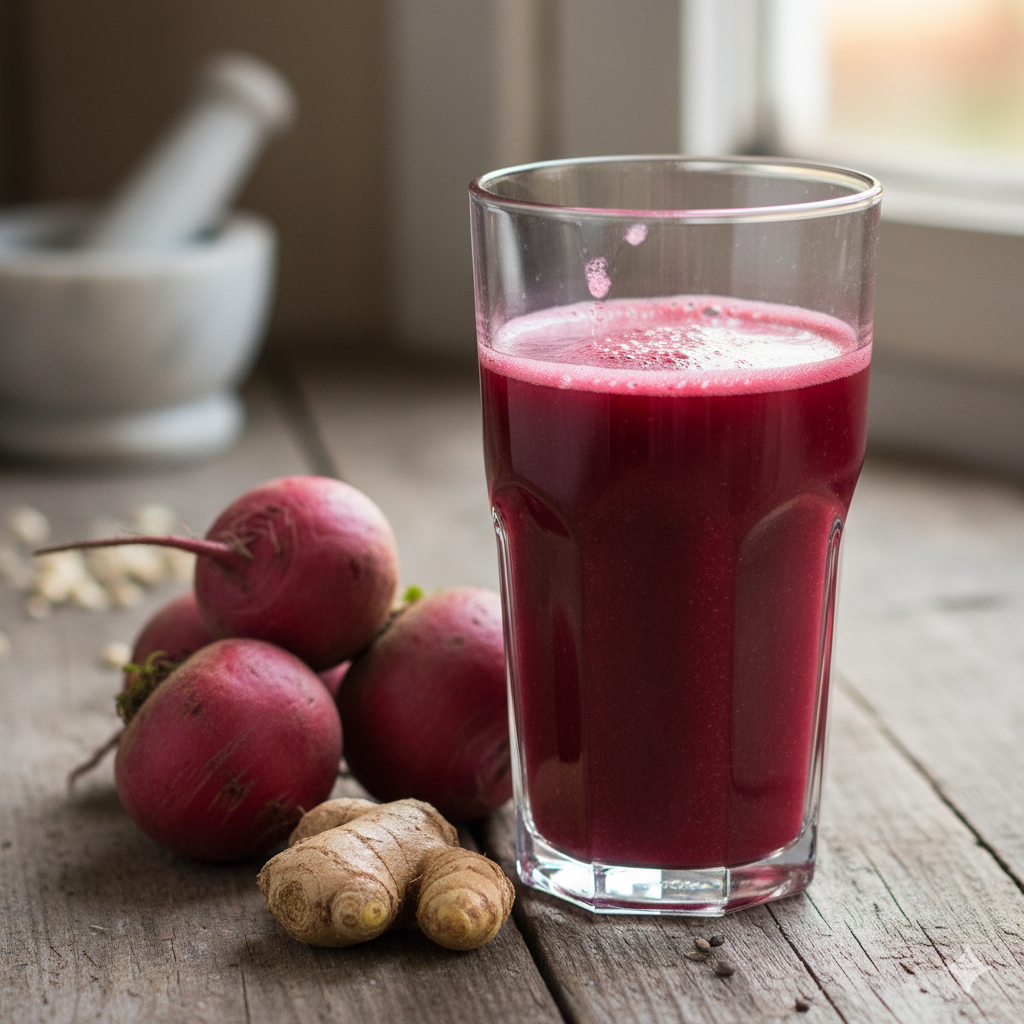
The Real Science of Beet Juice & Nitric Oxide: What Most “Energy Boosters” Miss
Fatigue rarely comes from a lack of oxygen—it’s usually a delivery problem. The body needs nitric oxide (NO) to open micro-vessels so oxygen and nutrients actually reach working tissue. Beetroot is the most studied dietary route to boost NO via intake → nitrite → NO.
Why Nitric Oxide Matters
Nitric oxide is a signaling molecule that relaxes blood vessels (vasodilation), improves micro-circulation, and reduces the oxygen cost of exercise. Multiple human trials show that dietary nitrate, often delivered as beetroot juice or powder, increases plasma nitrite and improves exercise efficiency and tolerance.
In running and cycling models, acute nitrate from beetroot has improved time-trial performance and power output, indicating practical benefits beyond lab markers.
What Undermines Your NO Pathway
The most powerful step depends on oral bacteria. Antiseptic mouthwashes can suppress these microbes, lowering plasma nitrite and nudging blood pressure upward—one reason some people “lose” beet benefits without realizing why.
Age-related endothelial decline also reduces NO availability, which helps explain why older adults often feel a stronger response to nitrate support.
What the Research Shows (Concise Evidence)
- Lower oxygen cost, better tolerance: Beetroot nitrate reduced the O2 cost of submaximal exercise and enhanced tolerance in controlled trials.
- Performance outcomes: Acute nitrate improved 4-km and 16.1-km cycling time trials (higher power at lower VO2).
- Blood-pressure support: Randomized, double-blind phase-2 trial showed sustained clinic and 24-hour BP reductions with dietary nitrate in hypertensive patients.
- Broader clinical context: Reviews and meta-analyses reinforce the ergogenic and cardiometabolic potential of nitrate-rich beet interventions.
- Oral microbiome linkage: Short-term antiseptic mouthwash can lower oral nitrate reduction by ~90% and reduce circulating nitrite—an often-ignored blocker of benefits.
Debunking Common Myths
“Beet juice is just sugar water.”
When standardized for nitrate yield, beetroot concentrates are a clinical-grade NO strategy with repeated human data on exercise efficiency and blood-pressure outcomes. It’s the nitrate and downstream nitrite that matter, not sugar content.
“Only elite athletes benefit.”
Hypertensive and older populations demonstrate measurable responses, likely because baseline endothelial function and NO availability are lower—leaving more room to improve.
“Eating a few beets is enough.”
Matching trial doses typically requires the equivalent of multiple whole beets daily. Concentrated powders and juices solve for dose, palatability, and consistency across days.
The Simple 7-Day Nitric Oxide Protocol
- Dose: Take a clinically profiled beetroot powder providing a meaningful nitrate yield twice daily (e.g., morning and 60–90 minutes pre-training).
- Track: Note resting heart rate, perceived exertion, HR recovery after a standard effort, and any blood-pressure changes if you monitor BP.
- Protect the pathway: Avoid antiseptic mouthwash around dosing windows; keep oral breathing minimal during the day if possible.
If you’re on blood-pressure medication or have cardiovascular concerns, discuss nitrate supplementation with your clinician before starting.
Implementing the Science (Product Insert)
Once the pathway is clear, the practical question is dose and repeatability. PureClean Beet was designed to deliver consistent nitrate alongside supportive polyphenols, with low sugar and clear sourcing. If you want a fast, measurable test of the pathway, start the 7-day protocol with PureClean Beet and record your metrics.
FAQ
How long until I feel a difference?
Some notice lower perceived exertion within a few days; many trials measure effects within 3–7 days of consistent dosing.
Can I mix beet powder with coffee or protein?
Yes. Many prefer it on an empty stomach pre-training to align with peak plasma nitrite. If you’re highly sensitive to caffeine, separate doses.
Isn’t blood pressure already managed by meds?
Dietary nitrate is not a substitute for medication. Some trials in hypertensive adults show additional BP support from nitrate-rich beet interventions; discuss any changes with your clinician. :contentReference[oaicite:14]{index=14}
Key References
Bailey SJ et al. Dietary nitrate reduces O2 cost and improves exercise tolerance. J Appl Physiol (2009).
Lansley KE et al. Acute dietary nitrate improves cycling time-trial performance. Med Sci Sports Exerc (2011).
Jones AM. Dietary nitrate & exercise performance (review). Sports Med (2014).
Kapil V et al. Dietary nitrate provides sustained BP lowering in hypertension (RCT). Hypertension (2015).
Morou-Bermúdez E et al. Oral bacteria–NO pathway; mouthwash impact on nitrate reduction. Adv Nutr (2022).
Seals DR et al. Aging & endothelial dysfunction (review). J Appl Physiol (2011).
